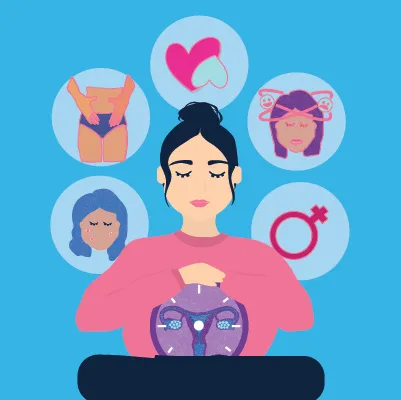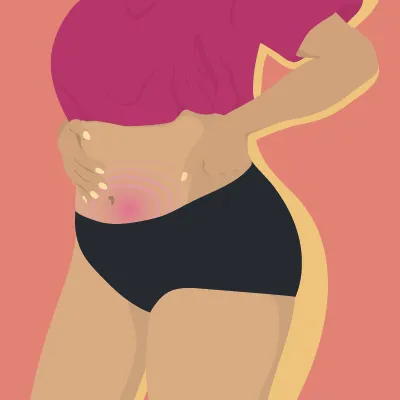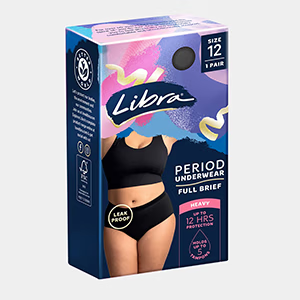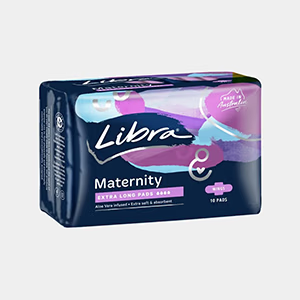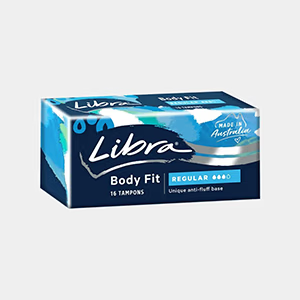Feb 12, 2023
Everything you need to know about menopause
Menopause is a little bit like waiting for your first period to arrive. It brings a new, unknown chapter in your life and the anticipation of it can feel overwhelming. Of course, you’re much wiser since you started menstruating, but nevertheless, experiencing menopause may feel challenging at times. Whether you’re counting down the days until your period finally stops or you’re concerned about the changes to come, we’re here to help you navigate menopause.
What is menopause?
Menopause is when you stop having menstrual cycles, and it’s a normal part of life. This happens when your production of female hormones - oestrogen and progesterone - slows down and eventually halts your ovaries’ egg production.
This process starts with perimenopause, which is when your ovaries gradually start hitting the brakes. The main signs of menopause are hormone-related: it can cause irregular period lengths (shorter or longer), lighter bleeding, and a less predictable cycle. It’s also when the risk of developing osteoporosis, weakening of the bones, starts increasing. Oestrogen is linked to maintaining bone strength, so when it drops, the likelihood of developing osteoporosis rises.
You’ll know you’ve reached menopause when you haven’t had any menstrual bleeding for 12 months. Most people won’t require a formal diagnosis for menopause – if you’re of a certain age and you’re not having any periods, consider it done.
What is postmenopausal bleeding?
Postmenopausal bleeding or something resembling a menopause period is not your menstrual cycle making a comeback. Postmenopausal bleeding can be caused by factors such as vaginal dryness, atrophy, or gynaecological cancers such as endometrial cancer or cervical cancer. It’s important to consult with a healthcare professional if you notice any postmenopausal bleeding to manage what’s causing it.
When does menopause start?
Menopause usually happens around the ages of 45 to 60, with the average age being 51. Generally speaking, you can’t really predict your last ever period, just like you can’t predict your first – it’ll happen when your body is ready. However, menopause may be brought on suddenly as a side effect of some medical interventions, such as medication or surgery.
Some people experience menopause earlier in life. The signs of early menopause and premature menopause are the same as typical menopause. It’s called early menopause if it happens between 40 and 45, and premature menopause if it happens before 40. Since menopause means you can’t fall pregnant naturally, this might be concerning for anyone hoping to become pregnant. In some cases, in vitro fertilisation (IVF) or other options might be an alternative.
How long does menopause last?
After the final period, people generally experience menopause symptoms for four to five years on average. It can be shorter or longer, depending on lifestyle factors such as your physical health and fitness, smoking status, and alcohol intake.
Maintaining a healthy lifestyle is not only good advice for dealing with menopause-related symptoms but for healthy living in general. Everyone’s experience with menopause is different and unique, so what works for someone might not work for you.
What are the symptoms of menopause?
There are many physical and emotional symptoms associated with menopause. You might experience some, none, or all of them – again, it differs from person to person. If your symptoms are impacting your daily life, it’s important to talk to a healthcare professional to discuss treatment options.
Physical
- Menstrual cycle changes
- Hot flushes
- Night sweats
- Insomnia
- Tiredness
- Reduced sex drive
- Vaginal changes, such as dryness
- Urinary changes, such as urinating more often
- Muscle or joint pain
- Sore breasts
- Headaches
- Weight gain
Emotional
- Mood changes or swings
- Forgetfulness
- Trouble concentrating
- Irritability or frustration
- Low mood
- Anxiety
- Depression
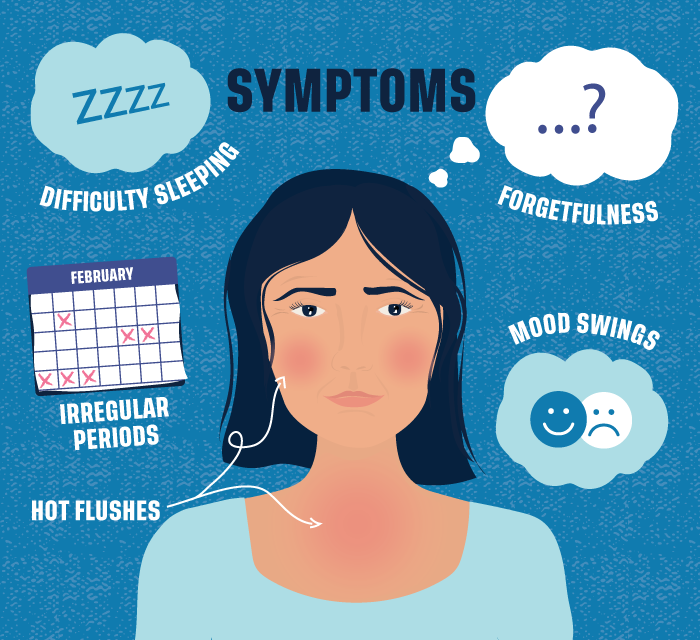
How can I manage menopause symptoms?
Depending on the symptoms you experience, there are options a healthcare professional can recommend for you. What they suggest will depend on the severity of your symptoms and risk factors.
Menopausal hormone therapy (MHT) used to be called hormone replacement therapy (HRT), and helps manage menopausal symptoms when they’re affecting someone’s daily life. They can be prescribed as pills, patches, vaginal creams, intrauterine devices (IUD), or a combination, depending on what your doctor says is best for you.
Non-hormonal medications can be prescribed to help with symptoms like hot flushes, headaches, anxiety, and depression. There are also a number of complementary therapies, such as cognitive behavioural therapy (CBT), and natural therapies that have some evidence to support their effectiveness for reducing menopausal symptoms. Although non-prescription options don’t require talking to a doctor, it’s best to speak with a healthcare professional before starting any new treatment.
What products should I use while I’m going through menopause?
By the time you reach menopause, you’ll likely have your favourite, tried and tested period care products. However, as your cycle becomes less predictable, you may find that you need a little backup. Liners and our Period Proof Briefs are great options to provide discreet protection in case you experience some unexpected bleeding.
Where can I find support during perimenopause and menopause?
We recommend talking with people you trust or seeking resources to find extra support while you go through perimenopause and menopause. These might include healthcare professionals, friends and family, and support communities.
It wasn’t long ago that menopause was something people didn’t openly talk about. Many people might recall older family members or friends going through a rollercoaster of emotions, but downplaying what was really going on. Thankfully, conversations around menopause are becoming more frequent and vocal, allowing people going through it to feel informed, supported, and empowered.
For more information on the menopause and some misconceptions around it, take a look at our article on Menopause: The Myths.
Love, Libra x
Essity makes no warranties or representations regarding the completeness or accuracy of the information. This information should be used only as a guide and should not be relied upon as a substitute for professional, medical or other health professional advice.


